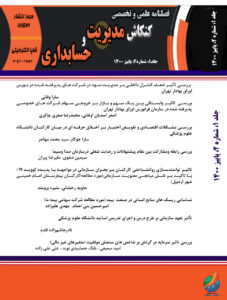مقاله: پژوهشی
صفحه: 24- 47
نویسندگان:
علیرضا اسکندری[1]*، محمد محمدی[2]، زهرا اسکندرپور[3]
[1] استادیار گروه حسابداری، موسسه آموزش عالی رسام، کرج، ایران (a.eskandari@rasam.ac.ir)
[2] استادیار حسابداری، گروه حسابداری، دانشگاه غیرانتفاعی پرندک (Mkz.mohamadi@gmail.com).
[3] دانشجوی کارشناسی ارشد حسابداری مدیریت دانشگاه غیرانتفاعی پرندک (Zahra_eskandarpour@yahoo.com).
چكيده
بررسی نقش تعدیلگرِ ویژگیهای هئیت مدیره بر رابطه بین کیفیت افشاگریهای محیطزیستی و ریسکپذیری مدیرعامل در شرکتهای پذیرفته شده در سازمان بورس اوراق بهادار تهران میباشد. اطلاعات اخذ شده در رابطه با متغیرهای تحقیق وارد صفحه گسترده اکسل شده و سپس با استفاده از نرم افزار ایویوز تحلیل شدند. جامعة آماری این پژوهش به روش حذف سیستماتیک از میان 138 شرکت های پذیرفته شده در بورس اوراق بهادار تهران، طی دورة زمانی 1392 تا 1399 می باشد. نتایج فرضیه نخست نشان داد که نتایج نشان میدهد که بین کیفیت افشاگریهای محیطزیستی و ریسکپذیری مدیرعامل رابطه معناداری و منفی وجود دارد. نتایج فرضیههای دوم تا ششم نیز به ترتیب نشان دادند که اندازه هیئت مدیره و استقلال هیئت مدیره رابطه بین کیفیت افشاگریهای محیطزیستی و ریسکپذیری مدیرعامل را تعدیل میکند. دانش مالی هیئت مدیره، درصد مالکیت اعضاي هیات مدیره و دوگانگی وظایف هیئت مدیره رابطه بین کیفیت افشاگریهای محیط زیستی و ریسکپذیری مدیرعامل را تعدیل نمیکند. در خصوص تحلیل نتایج از منظر تئوری و همچنین از دیدگاه پژوهشگر، میتوان بیان داشت که بر مبنای شواهد حاصل، مدیران باید گزارشدهی پایداری مستقل را انتخاب کنند، زیرا این امر اطلاعات مربوط به افشای محیطی را افزایش میدهد و به سرمایهگذاران اجازه میدهد تا مسائل زیستمحیطی را در تصمیمگیریهای سرمایهگذاری لحاظ کنند. هیئت مدیرههای بزرگتر منجر به تنوع از نظر تخصص، از جمله مالی و حسابداری میشود. مدیران مستقل دارای انگیزهها، ارزشها و ریسکپذیریهای متمایزی نسبت به مدیران داخلی هستند که معمولاً به اهداف کوتاهمدت پرسود توجه میکنند.
کلمات کلیدی: توسعه، دولت، الکترونیک، مدیریت مبتنی بر ارزش
Investigating the moderating role of board of directors’ characteristics on the relationship between the quality of environmental disclosures and the CEO’s risk-taking
Alireza Eskanderi,[1] Mohammad Mohammadi[2], Zahra Eskanderpour[3]
